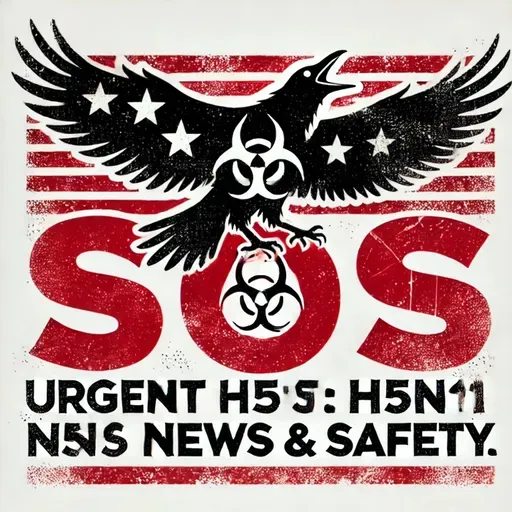
30 August 2025
H5N1 Bird Flu Outbreak Resurges in California Dairy Farms Raising Concerns About Virus Transmission and Public Health
Bird Flu SOS: Urgent H5N1 News & Safety
About
This is Bird Flu SOS: Urgent H5N1 News & Safety, your emergency resource for the latest on the rapidly evolving H5N1 bird flu situation. Today is Saturday, August 30th, 2025. We begin with an urgent update: U.S. authorities have re-quarantined 43 California dairy farms following fresh detections of H5N1 bird flu, just weeks after they had been declared clear. Investigations show the virus is persisting in livestock and continuing to cause outbreaks, raising new concerns about animal and public health, according to the California Department of Food and Agriculture.
Globally, H5N1 remains a major concern. The CDC confirms 26 human infections since January, with 11 deaths reported across Cambodia, India, and Mexico. In the U.S., officials have reported three human cases this year, all involving people with direct contact with infected birds or livestock. There is no current evidence of human-to-human transmission, and U.S. health authorities maintain that public risk remains low, but these developments underscore the ongoing threat.
Dr. Sarah Williams of the CDC stresses the seriousness of the situation, saying, “Continued detection of H5N1 in dairies that were recently declared virus-free demonstrates the persistence of this virus and the need for vigilance.” Similarly, Dr. Erik Karlsson from Cambodia’s National Institute of Public Health warns, “The recent fatal cases show that H5N1 infections can become severe quickly, especially in those with direct exposure.” Authorities in Colorado and California have implemented enhanced monitoring and mandatory milk testing to slow the spread in livestock.
If you live or work near affected farms, here are immediate action steps:
- Avoid any contact with sick or dead birds and animals.
- Do not consume raw or unpasteurized milk or dairy products from affected regions.
- Wear gloves and a mask if cleaning animal enclosures or handling potentially contaminated materials.
Be alert to these urgent warning signs, which demand immediate medical attention:
- Sudden onset of high fever, cough, sore throat, or shortness of breath, especially after animal exposure.
- Red or irritated eyes following contact with birds, dairy cattle, or their environments.
- Any flu-like symptoms that rapidly worsen.
If you experience these symptoms, contact your healthcare provider or local public health agency right away. For emergency assistance, call your state health department hotline or, if you are in California, the Department of Food and Agriculture at 1-800-491-1899.
For reliable updates, follow the CDC and USDA. Local news and public health bulletins remain your best source for timely, region-specific guidance.
While these events are cause for increased concern, experts repeat: there is currently no sustained person-to-person transmission. According to the CDC, the situation demands heightened awareness but not alarm. Protective measures remain effective if followed consistently.
Thank you for tuning in to Bird Flu SOS: Urgent H5N1 News & Safety. Stay informed, stay prepared, and come back next week for essential updates. This has been a Quiet Please production. For more, check out QuietPlease.AI.
For more http://www.quietplease.ai
Get the best deals https://amzn.to/3ODvOta
Globally, H5N1 remains a major concern. The CDC confirms 26 human infections since January, with 11 deaths reported across Cambodia, India, and Mexico. In the U.S., officials have reported three human cases this year, all involving people with direct contact with infected birds or livestock. There is no current evidence of human-to-human transmission, and U.S. health authorities maintain that public risk remains low, but these developments underscore the ongoing threat.
Dr. Sarah Williams of the CDC stresses the seriousness of the situation, saying, “Continued detection of H5N1 in dairies that were recently declared virus-free demonstrates the persistence of this virus and the need for vigilance.” Similarly, Dr. Erik Karlsson from Cambodia’s National Institute of Public Health warns, “The recent fatal cases show that H5N1 infections can become severe quickly, especially in those with direct exposure.” Authorities in Colorado and California have implemented enhanced monitoring and mandatory milk testing to slow the spread in livestock.
If you live or work near affected farms, here are immediate action steps:
- Avoid any contact with sick or dead birds and animals.
- Do not consume raw or unpasteurized milk or dairy products from affected regions.
- Wear gloves and a mask if cleaning animal enclosures or handling potentially contaminated materials.
Be alert to these urgent warning signs, which demand immediate medical attention:
- Sudden onset of high fever, cough, sore throat, or shortness of breath, especially after animal exposure.
- Red or irritated eyes following contact with birds, dairy cattle, or their environments.
- Any flu-like symptoms that rapidly worsen.
If you experience these symptoms, contact your healthcare provider or local public health agency right away. For emergency assistance, call your state health department hotline or, if you are in California, the Department of Food and Agriculture at 1-800-491-1899.
For reliable updates, follow the CDC and USDA. Local news and public health bulletins remain your best source for timely, region-specific guidance.
While these events are cause for increased concern, experts repeat: there is currently no sustained person-to-person transmission. According to the CDC, the situation demands heightened awareness but not alarm. Protective measures remain effective if followed consistently.
Thank you for tuning in to Bird Flu SOS: Urgent H5N1 News & Safety. Stay informed, stay prepared, and come back next week for essential updates. This has been a Quiet Please production. For more, check out QuietPlease.AI.
For more http://www.quietplease.ai
Get the best deals https://amzn.to/3ODvOta